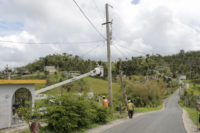Renewable Energy
Feds Select Four Project Teams to Strengthen Puerto Rico's Electric Grid

The U.S. Dept. of Energy selected four teams for funding to support efforts to build solar and battery storage facilities in Puerto Rico.
Photo courtesy U.S. Dept. of Energy
The U.S. Dept. of Energy will provide up to $365 million to four teams building solar and battery energy storage systems at multi-family housing properties and community health care facilities in Puerto Rico, officials announced Dec. 12.
Officials expect to award up to $190 million from the Puerto Rico Energy Resilience Fund’s Programa de Comunidades Resilientes for projects at public housing or privately owned multi-family properties subsidized by the U.S. Dept. of Housing and Urban Development. A team led by Puerto Rico Public Housing Administration is negotiating for an department award of up to $83.2 million, and a team led by Dynamic Solar Solutions is negotiating for up to $107.3 million.
Another $175 million is available for community health care facility projects. DOE officials selected a team led by Hispanic Federation Inc. for up to $58.3 million and another by Dynamic Solar Solutions for up to $116.2 million.
The selected teams. which already have a presence in Puerto Rico, each will coordinate development of projects at more than 100 properties.
A DOE representative said project details will not be available until after award negotiations have been finalized.
DOE's Grid Deployment Office launched the $1-billion fund last year to strengthen Puerto Rico's power grid after Hurricane Maria in 2017. other natural disasters and chronic underinvestment left it in an unreliable state. The fund is aimed to increase resilience of the territory’s power grid and help it meet all energy needs using renewable energy by 2050.
“Solar and battery storage is critical to this strategy, and thanks to the innovative Programa de Comunidades Resilientes, families will have expanded access to critical services and reliable electricity when and where they need it most,” U.S. Energy Secretary Jennifer Granholm said in a statement.
The announcement came onre day after the Office of the U.S. Trade Representative announced tariff increases on solar wafers and other solar equipment materials from China starting Jan. 1.
Tariffs on solar wafers and polysilicon will rise to 50%, with those on certain tungsten products increaseing to 25%.
The actions will complement domestic federal clean energy investments and increase resilience of critical supply chains, U.S. Trade Representative Katherine Tai said in a statement.




